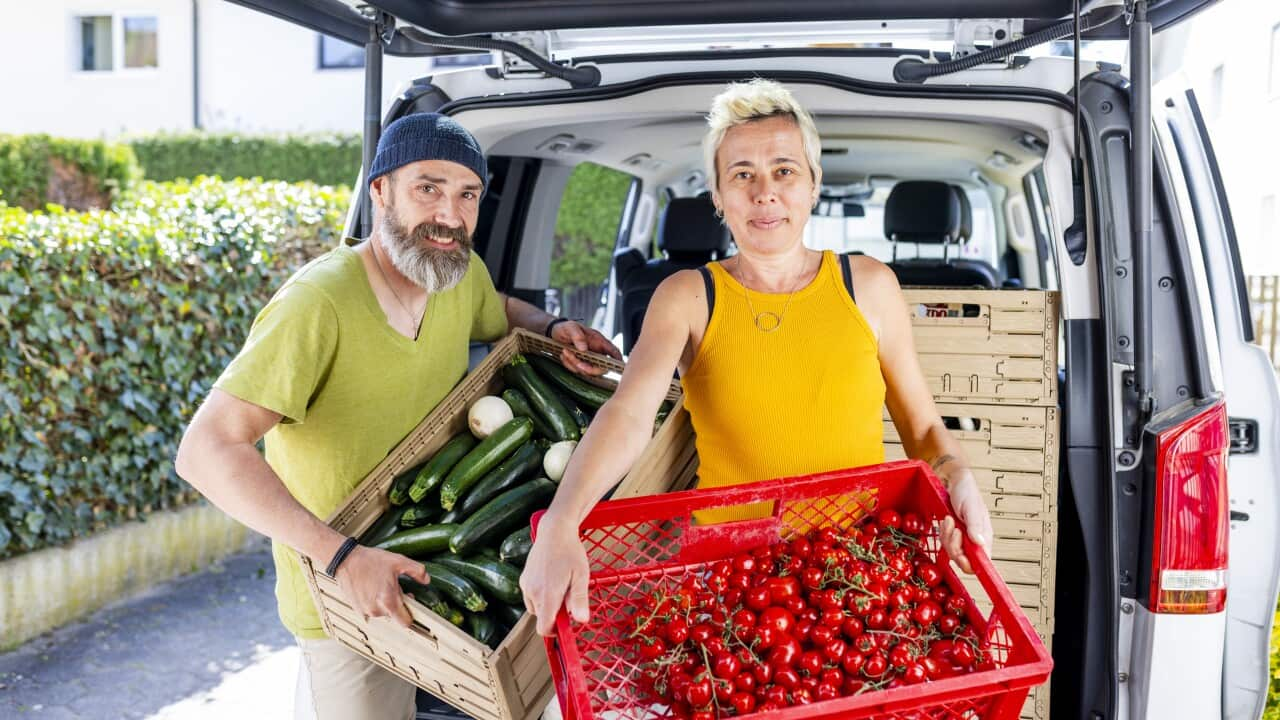Hamida Hossaini is proudly putting the finishing touches to a canvas of colourful flowers.
The refugee from Afghanistan loves art. And thanks to a Neighbourhood House in Melbourne, she is back at an easel again.
The 40-year-old said she enjoyed painting classes "back home in Afghanistan".
Painting life with her own colours
"I could never imagine getting back to classes to practise painting again. Since I moved to Australia, I felt ecstatic," she told SBS News.
It's a positive step for the mother of two, who spoke little English when she arrived in Australia three years ago with her engineer husband and young children.
However, the service that supports Hossaini and 10 million others across Victoria each year is itself struggling.

Neighbourhood Houses Victoria CEO Keir Paterson. Source: SBS / Sandra Fulloon
"Going into Christmas, everyone's costs are going up, and people relying on income support find it does not stretch for the two weeks.
"So they come to the Neighbourhood House, to get a box of food or access the food pantry to keep them going.
However, Victoria's 400 Neighbourhood Houses are under financial pressure and may be forced to cut back services if they do not receive additional funding, he said.
The charity runs on a shoestring budget, employing 5,500 staff in Victoria who are supported by almost 7,000 volunteers.
For many recent arrivals, classes help to overcome isolation in a new land.
"Learning English helps me to go shopping, or talk to my children's teacher or meet new people," Hossaini said.
"It makes me feel strong. I don't feel scared now. I am not scared."
Hossaini loves learning and says it's the main reason she fled her homeland with her husband and two daughters.
The ruling Taliban have placed strict bans on women's education since regaining power in 2021.
"Girls were only supposed to study in primary school, and after that, they just have to stay home. They don't have the right to go to higher education," Hossaini said.

Hamida Hossaini and her English teacher Mahsan Ahmadi. Source: SBS / Sandra Fulloon
The family was approved for a humanitarian visa and travelled to Australia in November 2021 via Iran.
Although excited by the new opportunity, leaving home came at a cost.
"That was the most terrible moment I experienced in my life. The most bitter one, that I had to leave my family home and country and start a new life where I don't know anything about it," she said.
Charities face increasing demand from the community
The Ascot Vale Neighbourhood House in the Wingate Avenue Community Centre opened in 1985 and has since grown steadily.
However, general manager Angie Courtenay says that amid a cost of living crisis, resources are being stretched.
"In recent years, demand has doubled for our food relief program. Demand for employment support, such as finding a job and getting ready to start a job, has also more than doubled," she said.
"We are seeing a lot of community members coming in extreme distress," she said.
“For some, that means choosing between paying for petrol for the car or buying food for the kids for the night."
Across Victoria, Paterson said this year, more than 13 tonnes of food were being delivered daily to Neighbourhood Houses. Although most of the food is donated, running costs are rising.
"The last time we did a major survey of the sector, 45 per cent of Neighbourhood Houses reported that they were running at a loss. That's clearly unsustainable over the long-term," he said.

Steve Perry delivering donated food to the Wingate Avenue Community Centre. Source: SBS / Sandra Fulloon
"Houses in regional or remote areas may be the only service in that area providing material and food relief.
"So, closing that down will have a disastrous impact on local communities, particularly on the most vulnerable people."
Government support to the rescue?
For the first time, Paterson said Australia's 1,000 Neighbourhood Houses and community centres would seek federal government support next year.
Hossaini is among more than 170,000 weekly visitors to a Neighbourhood House in Victoria and benefits from its wrap-around services.
"She has come from an environment where she was unable to engage in society as a female. And she has come here and really embraced every opportunity," Courtenay said.
"And not only for herself but for her daughters, who were unable to study in their own country. It has been a great journey for [Hossaini]. And I'm super proud of her."

Angie Courtenay (left), Hamida Hossaini (centre) and Mahsan Ahmadi at the Neighbourhood House. Source: SBS / Scott Cardwell
"The [Neighbourhood House] staff treat us with an understanding of emotional wellbeing," she said.
"And I have found many friends here who are the same as me. As migrants, we share the same pain. We can talk about our culture, our countries back home.
"I feel really comfortable and really happy here. I feel I belong to this community," she said.












